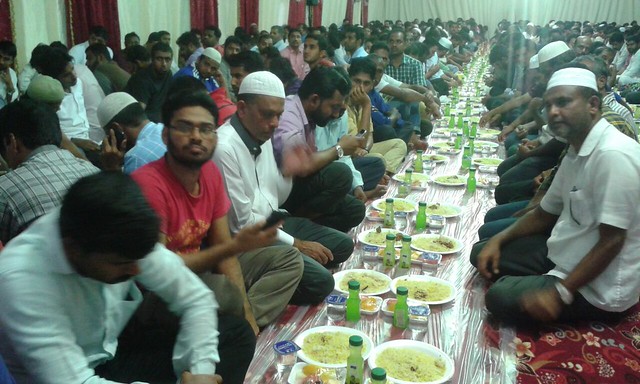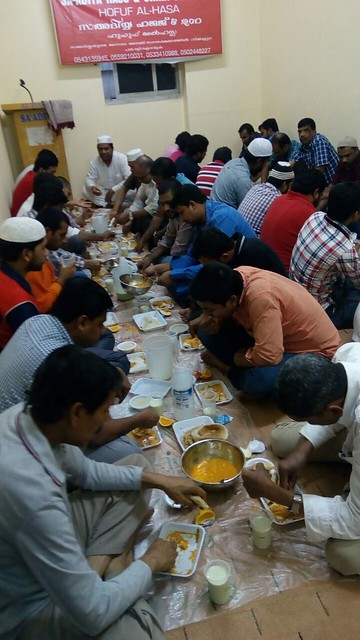By Shafeeq Hudawi, TwoCircles.net
Kozhikode: For most Indian Muslim expatriates, Ramadan is the time they most wish they could be home, so that the most important month in the Islamic calendar is spent with family. However, the reality of the modern life can often be harsh; most end up remaining at their working places, far away from their homes. So, even as they work across the globe, they cannot help but feel homesick at the thought of special prayers, Iftar and pre-dawn food (Sehri).
“Mosques, adorned with lights, Ifthar parties, where favourite local snacks and dishes are served, beckon us during every Ramadan. But, most of us are unable to answer as duty to earn livelihood leaves them here only during the holy month,” Jabir Nangarath, a young expatriate from Kasargod district of Kerala, told Twocircles.net. The youngster working in Dubai says he misses the long Taraweeh prayers, mixed with Dikrs and special prayers. It is a feeling shared by his friends Mohammed Haneef and Abdul Naseer from Malappuram and Palakkad districts of Kerala.

Expatriates taking part at Ifthars, held in Dubai.
“People here also congregate in mosques and perform prayers and recite Qura’n. But what we miss here the spiritual intercourse that the mosques in Kerala witness after every namaz,” says Haneef. “Knowledge and wisdom prosper while we attend the elocution in mosques during Ramadan,” says Farhan Chougle from Ratnagiri in Maharashtra.
While mosques turn active during Ramadan, especially last ten days of the month, expatriates in some countries are constrained to offer prayers from their rooms.
“We use to spend day and night in mosques. But in some parts of Singapore and Malaysia, the scenario is different as mosques are exclusively allotted for prayers,” says Suhail Hidaya, who has been studying in International Islamic University of Malaysia in Kaula Lumpur for last three years.
Unlike GCC countries and other parts of the world, India is a country where rituals and vocal customs like Moulids (praise to holy persons like Prophet his followers and Sufis) are considered an important part. “On Ramadan 17, the air is filled with chanting of Moulids from mosques in Muslim strong holds of Kerala commemorating martyrs of Badr, the first war by Prophet and his followers. But such traditions find no place in no GCC country,” says Mohammed Niyas, an expatriate from Malappuram, who is working in Doha. Jamaludheen from Palakkad, working in Saudi Arabia shares the same experience he met in mosques.

NRIs attending an Ifthar, held at Al Hassa in Saudi Arabia
Muslims all over the world assure that no man with fasting persons goes hungry at sunset. Mosques, shops, hotels or homes of Muslims in GCC and other Muslim countries maintain an healthy competition in maintaining this tradition intact. “Iftars, offering delicious foods are plenty of. But, they fail to enthuse us as they are left without local Ramadan snacks like Unnakka, Pazhampori, ulli vada, Samoosa and Irachi pathiri,” says Mohammed Favas from Thrissur working in Doha. For Ahsan Akhthar, a youngster from Bhopal, working in Dubai, evening without Samosa, Bhopali Kabab, and Keema Pulavu is not Iftar in its true spirit. Similarly, Farhan, from Ratnagiri, misses Marati delicacies ranging from Baithi Rotti to Sukat Fry.
Abdul Nasar, who works in Riyadh of Saudi Arabia, laments on packet juices and Arabian dishes he gets for Iftar in mosques. This also explains why Indians are always keen to attend Iftars by various organizations from their respective states as they are provided with local delicacies. “I feel lucky that I can have Porotta and Pathiri along with beef curry, which is similar to the food at home,” he says.
But this year, the biggest miss for Keralites is the monsoon, which makes their fasting an easy affair with no worries about thirst and tiredness. “In GCC, those who are working outside have a difficult turn with scorching sun, which makes it tough to fast. Besides, the day is also long,” says Shahid Mohammed from Malappuram in Kerala. He is working in Dubai with Cadburry.
Some of the employees in GCC have it a little easier, courtesy long breaks during days and the reduced working hours. But sales men and shop keepers have to work long hours too besides fssting, as shops remain open late night.
Shahid sums up the month of Ramadan for he thousands of Muslims living abroad. “All comforts aside, it is impossile to not miss home. It is not just the place; it is the people, the customs and the day to day affairs. It could be replaced by nothing,” he adds.

